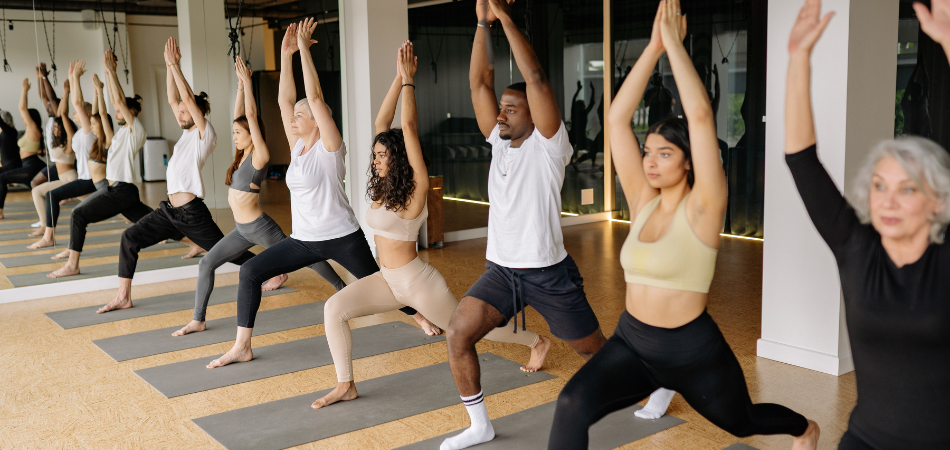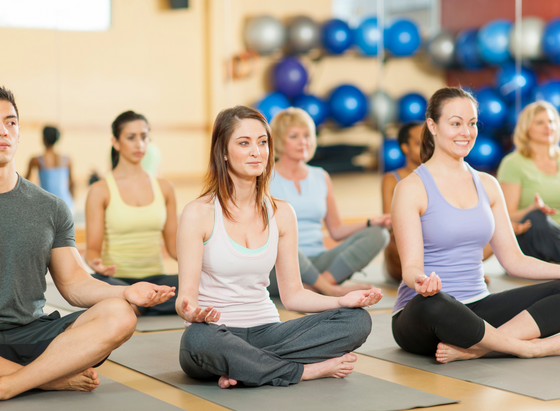Yoga therapy

Written by:
Last Updated:
March 10th, 2025
For many people, the idea of yoga conjures up images of contorting their bodies into pretzel-like shapes or sitting in silence for hours on end. However, yoga is much more than just a physical discipline – it can also be an incredibly effective tool for treating addiction.
What is yoga therapy?
Yoga therapy is a form of treatment that uses yoga to promote physical and mental well-being. The physical practice of yoga helps to reduce stress levels and detoxify the body while breathing exercises and meditation help to calm the mind and ease anxiety.
Many people struggling with addiction find themselves feeling lost and disconnected from their bodies and minds. Yoga therapy can help you to reconnect by teaching you to focus on the present moment and be more aware of your thoughts and feelings.
What does a yoga therapy session involve?
Yoga therapy sessions typically last between sixty and ninety minutes and may be conducted one-on-one or in a group setting. During a session, your therapist will usually start with some basic breathing exercises (known as pranayamas) to help you relax and clear your mind. Next, they will guide you through a series of physical poses (known as asanas) and may also use guided imagery or yogic meditation to help you focus on positive thoughts and achieve a state of mindfulness. At the end of the session, your therapist may give you some techniques to practice in your spare time such as breathing exercises or practising poses you learned during the session.
What are the goals and benefits of yoga therapy?
The goal of yoga therapy is to promote overall wellness and help you manage stress, anxiety, and other mental health conditions that are typically present with addiction. Yoga practice can help to reduce cravings, ease withdrawal symptoms and promote emotional balance and can benefit people with alcohol addiction, drug addiction and behavioural addiction.
Yoga therapy is beneficial both during rehab and after you go back home. During rehab, yoga can help you through difficult moments and reinforce the lessons and tools you are learning about self-awareness, mindfulness and strength of mind. After rehab, it can help to quiet your mind when cravings flare up and help you deal with stressful moments.
Yoga therapy at Sanctuary Lodge
Sanctuary Lodge offers yoga therapy as part of our holistic approach to addiction treatment and recovery. We believe that yoga therapy can be an extremely effective tool in the recovery process and our yoga therapists are highly trained and experienced in working with individuals in addiction recovery.
Sanctuary Lodge’s expert yoga therapist explains more about the philosophy behind our yoga therapy programme:
“The issues are in the tissues (those in our bodies, not the ones we use to blow our noses!) Tailor-made yoga therapy helps you to reconnect to your mind, body and soul by integrating our 12-step addiction recovery programme with our ‘keep it simple’ mantra. This enables you to improve present-moment awareness which will help you deal with negative thoughts, cravings and difficult moments. The reconnection to the physical body also helps those in recovery make amends to themselves for the harm done in addiction. Our classes are really focused on healing one day at a time, and one breath at a time.”
How does yoga complement other addiction recovery therapies?
While there is no one-size-fits-all approach to addiction treatment, yoga can be an effective complementary therapy for many people in rehab. One of the most common types of therapy for addiction is Cognitive Behavioural Therapy (CBT), which helps people to become aware of and change negative thought patterns. Yoga can complement CBT by helping people to centre themselves, focus on the present moment and control their emotions and reactions. Group therapy is another important form of addiction treatment and yoga can help people in group therapy to feel more relaxed and connected to each other so they are more confident opening up.
How can yoga help you after you leave rehab?
Yoga therapy can be an effective tool for continuing your recovery after leaving rehab. The physical and mental benefits of yoga can help to reduce stress, improve mood and promote healthy sleep patterns. In addition, the mindfulness that is cultivated through yoga during rehab can help you manage triggers and avoid relapse once you have left the sanctuary of rehab.
When practised regularly, yoga can help to create a sense of calm and well-being, which can be a powerful force in your continued recovery. Joining a yoga class can also be a great way of maintaining a healthy lifestyle and meeting new friends, both of which can be very beneficial in building a support network of people who don’t use drugs or alcohol and can be a positive influence in your new sober life.
Frequently asked questions
Disclaimer:
The availability of therapies may vary across UKAT centres. The specific therapies provided will be determined based on your treatment plan and the programme offered at your chosen facility. All treatments are subject to clinical assessment and programme availability at the time of admission. For further details on the therapies included in your treatment plan, please contact our admissions team.





